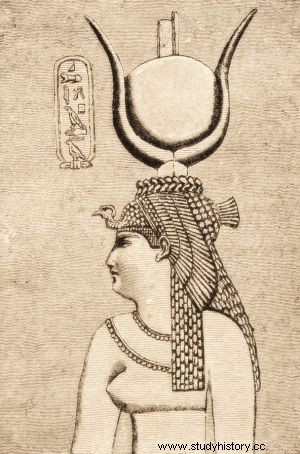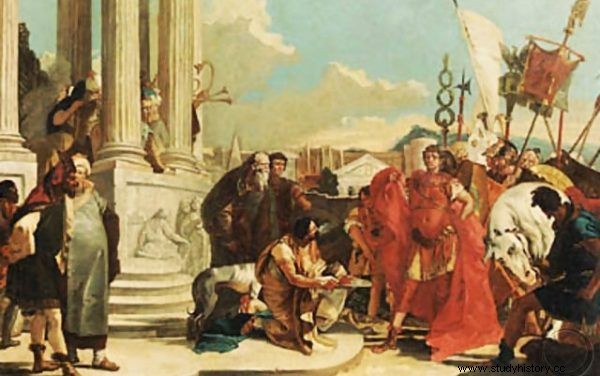b> Horace thought she had trouble drinking. Josephus, Flavius, directly called her a woman overwhelmed by lust. The Roman poet Propercius claimed she was a harlot giving herself to her own slaves, and the historian Cassius Dio believed she was a witch. We know one thing for sure. For power, she was ready for anything
At first everything was going according to plan. The seventh Egyptian ruler named Cleopatra ascended the throne in 51 BCE, the same in which Julius Caesar suppressed an uprising in Gaul. She was eighteen at the time and had just married her younger brother Ptolemy XIII. These were the plans of their father, Ptolemy XII Auletes. And the tradition of the pharaohs.
Everything stays in the family
Egyptian dynastic incest dates back to ancient times and the custom of inheriting the throne in the female line (the eldest daughter of Pharaoh was his successor). It was a simple calculation - only the mother is always sure. It is different with fatherhood.
In any case, the Ptolemy reached for this tradition and successfully married brothers to sisters. And, counting that they considered themselves gods on earth, it was a sin to thin out God's blood. But let's leave the incest case aside and get down to business.

18-year-old Cleopatra did not expect any resistance to her rule. And its charm ... (painting by Italian painter Mosè Bianchi from 1865).
As she ascended the throne with her 10-year-old brother, Cleopatra expected that all power would fall into her hands. After all, she was perfectly prepared for this. For some time she ruled together with her father, after his death some time alone, and then, acting as a tradition enough, she took power together with her brother. She received a thorough education, spoke several languages, including the first Ptolemaic Egyptian - the language of her subjects.

Instead of patronizing the arts and temples, Cleopatra had to fight for power. Nevertheless, many of her images have survived, including the one from Dendera.
As early as 55 BCE she was the eldest living daughter of Ptolemy XII, so she knew the throne was her future. She had to take care of the country devastated by her father's inept rule, carry out the necessary reforms and deal with other equally pressing matters.
She attached great importance to Egyptian tradition and religion. She minted her own coin, and it seemed to her that the power and position she had gained were fairly stable. However, she did not foresee one thing - the power of courtly coterie.
About three who crossed the ranks
One of the parties at the Alexandrian court, centered around the young Ptolemy, consisted of the eunuch Pothejnos, the king's teacher, the rhetorician Theodetes of Chios, and the commander of the army, Achillas. These three managed to turn my brother-husband against Cleopatra and bring her down. Accused by the coterie of conspiracy against Ptolemy XIII, she lost her previous advantage.
Two years after her accession to the throne, the Queen was overthrown and fearing for her own life, she had to go up the Nile to Thebaida. The ambitious ruler was not going to give up. Instead of hiding somewhere on the outskirts of Africa, thinking about the loss of the throne until the end of her days, she decided to act.

Cleopatra wanted to rule herself, but something went wrong and instead of ruling, she had to run away ...
From Upper Egypt through the desert Cleopatra went to Palestine. There she found support from her father's former friends. She managed to form her own army, largely composed of Arab tribes. With this strength at her disposal, she marched to the capital, proud Alexandria. On the news of the approach of the city of forces recognized as defeated Cleopatra, Pothejnos, Theodetes, Achillas did not fall asleep pears in the ashes.
Together with the young Ptolemy and the army, they set off to meet the approaching soldiers of the queen, to block their way to the capital. As the two armies marched to fight the final battle, the civil war in Rome was involved in the civil war in Egypt.

The article was inspired by the novel "Cleopatra's Dream" by Christian Jacq (Znak Literanova 2014).
As always, Rome had to intervene!
The defeated Roman commander Pompey decided to seek refuge at the court of Ptolemy XIII, son of his former ally. Julius Caesar, who was chasing him, followed.
On the Egyptian shore, however, he found only the corpse of his adversary. The young king's three supporters thought that by killing Pompey they would get rid of Caesar from Egypt, who would as soon as possible return to Rome. Meanwhile, quite the opposite happened.
The Roman not only decided to stay, but in addition he decided to arbitrate between struggling siblings and fulfill their father's will.
Caesar and his legionnaires made themselves at home in Alexandria. The new tenant of the royal palace not only marked Egypt's dependence on Rome, but also demanded the immediate appearance of both the king and the queen. Ptolemy XIII rushed to the capital.
Cleopatra was in a much worse position - her brother's army blocked her way to Alexandria. An official trip would amount to suicide, and yet she had to speak to the Roman leader in person ...
This article has more than one page. Please select another one below to continue reading.Attention! You are not on the first page of the article. If you want to read from the beginning click here.
The young queen played it differently. She knew that to ignore Caesar's summons would be an unforgivable strategic mistake. She decided to get to Alexandria under the cover of night by sea. Together with her trusted servant Apollodor from Sicily, she got into a light and fast boat, which they sailed towards the capital. Once there, they used the filigree form of a queen to enter the palace.

And although they were bitter enemies, Caesar was not pleased with the gift of Pompey's head. (Picture entitled "Julius Caesar Contemplating Pompey's severed head").
It should be emphasized, however, that the famous move in the carpet and unfolding it at Caesar's feet is a shame. In fact, Apollodor smuggled Cleopatra in a sack tied with a thong. Then things turned out as we know it from pop culture - the queen appeared in Caesar's chamber in the evening and stayed until morning, enchanting the much older Roman with her cleverness, intellect, beauty and eloquence (she spoke Latin fluently).
Caesar had to clean up
In the morning, Ptolemy XIII became furious. He couldn't get over his sister's cunning, but there was little he could do. He had to publicly reconcile with Cleopatra and, in accordance with his father's last will, share power with her. Or rather:come to terms with the loss of power. Ptolemy was then under house arrest, and Cleopatra reigned.

The article was inspired by the novel "Cleopatra's Dream" by Christian Jacq (Znak Literanova 2014).
However, the supporters of the king who was detained in the palace against their will could not agree to this. After 15 days - fearing the murder of Ptolemy by the Romans and the complete inclusion of Egypt into the Roman Empire - they resumed military operations.
Caesar, along with Cleopatra (who had become his mistress) and with his soldiers, now became prisoners themselves. They were surrounded in the palace district of Alexandria. The eunuch Pothejnos summoned Achillas and his troops and tens of thousands of Alexandrians to help.
The younger and very ambitious sister of Cleopatra Arsinoe IV tried to take advantage of the situation. The girl escaped from the palace, where Ptolemy was still imprisoned, and joined her brother's army, proclaiming herself queen and changing commander. Achillas was killed and the eunuch Arsinoe became the army commander-in-chief.
This encouraged Caesar to take mad steps. To further confuse the opponent's ranks, he released Ptolemy - his main bargaining chip. Before the final hearing could take place, Mithridates of Pergamon, an ally of Rome, arrived with his army. The two chiefs joined their armies and defeated Ptolemy, and the young king drowned in the depths of the Nile while escaping .

Caesar and Cleopatra met for the first time ... but in reality there was a sackcloth of linen instead of a carpet.
After the victory, Caesar established a new order in Alexandria. He fulfilled Ptolemy XII's will, placing his two children on the throne - Cleopatra and ... another Ptolemy (the fourteenth of this name), the queen's even younger brother. The rebellious Princess Arsinoe was captured and, after a few months in chains, she graced Caesar's triumph in Rome.
Cleopatra, on the other hand, gained full power, relegating her new brother-husband to a purely representative role. In addition, she could count on the love and support of the most powerful man of her time, and ... she carried his child. Egypt, meanwhile, remained an independent state. At least for now.
